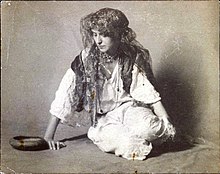Muslim Roma
| Part of a series on |
| Romani people |
|---|
|
Diaspora
|
|

Costume of a Romani woman (most likely Muslim Roma).

Muslim Roma in Bosnia (around 1900)
Muslim Roma or Muslim Gypsies are Romani people who adopted Islam. Roma have usually adopted the predominant religion of the host country. Islam among Roma is historically associated with life of Roma within the Ottoman Empire. Correspondingly, significant cultural minorities of Muslim Roma are found in Turkey, Bosnia and Herzegovina, Albania, Egypt, Kosovo, Republic of North Macedonia, Bulgaria (by mid-1990s estimates, Muslim Roma in Bulgaria constituted about 40% of Roma in Bulgaria.[1]), Romania (a very small group of Muslim Roma exists in the Dobruja region of Romania, comprising 1% of the country's Romani population)[2]), Croatia (45% of the country's Romani population[3]), Southern Russia, Greece (a small part of Muslim Roma concentrated in Thrace), Crimea and the Caucasus.
Because of the relative ease of migration in modern times, Muslim Roma may be found in other parts of the world as well.
After the collapse of the Ottoman Empire in the parts where Islam is no longer a dominant religion Muslim Roma have found themselves under double discrimination, both due to Antiziganism and Islamophobia.[4]
Muslim Roma throughout Southern Europe call themselves Horahane Roma ("Turkish Roma", also spelled as Khorakhane, Xoraxane, Kharokane, Xoraxai, etc.) and are colloquially referred to as Turkish Roma or Turkish Gypsies in the host countries.
See also
- Ashkali
- Romani mythology
- Roma in Turkey
References
^ Gerd Nonneman, Tim Niblock, Bogdan Szajkowski (Eds.) (1996) "Muslim Communities in the New Europe", .mw-parser-output cite.citation{font-style:inherit}.mw-parser-output .citation q{quotes:"""""""'""'"}.mw-parser-output .citation .cs1-lock-free a{background:url("//upload.wikimedia.org/wikipedia/commons/thumb/6/65/Lock-green.svg/9px-Lock-green.svg.png")no-repeat;background-position:right .1em center}.mw-parser-output .citation .cs1-lock-limited a,.mw-parser-output .citation .cs1-lock-registration a{background:url("//upload.wikimedia.org/wikipedia/commons/thumb/d/d6/Lock-gray-alt-2.svg/9px-Lock-gray-alt-2.svg.png")no-repeat;background-position:right .1em center}.mw-parser-output .citation .cs1-lock-subscription a{background:url("//upload.wikimedia.org/wikipedia/commons/thumb/a/aa/Lock-red-alt-2.svg/9px-Lock-red-alt-2.svg.png")no-repeat;background-position:right .1em center}.mw-parser-output .cs1-subscription,.mw-parser-output .cs1-registration{color:#555}.mw-parser-output .cs1-subscription span,.mw-parser-output .cs1-registration span{border-bottom:1px dotted;cursor:help}.mw-parser-output .cs1-ws-icon a{background:url("//upload.wikimedia.org/wikipedia/commons/thumb/4/4c/Wikisource-logo.svg/12px-Wikisource-logo.svg.png")no-repeat;background-position:right .1em center}.mw-parser-output code.cs1-code{color:inherit;background:inherit;border:inherit;padding:inherit}.mw-parser-output .cs1-hidden-error{display:none;font-size:100%}.mw-parser-output .cs1-visible-error{font-size:100%}.mw-parser-output .cs1-maint{display:none;color:#33aa33;margin-left:0.3em}.mw-parser-output .cs1-subscription,.mw-parser-output .cs1-registration,.mw-parser-output .cs1-format{font-size:95%}.mw-parser-output .cs1-kern-left,.mw-parser-output .cs1-kern-wl-left{padding-left:0.2em}.mw-parser-output .cs1-kern-right,.mw-parser-output .cs1-kern-wl-right{padding-right:0.2em}
ISBN 0-86372-192-3
^ Ana Oprişan, George Grigore, "The Muslim Gypsies in Romania", in International Institute for the Study of Islam in the Modern World (ISIM) Newsletter 8, September 2001, p.32; retrieved June 2, 2007
^ "Archived copy" (PDF). Archived from the original (PDF) on 2007-07-27. Retrieved 2009-02-06.CS1 maint: Archived copy as title (link)
^ Peter G. Danchin, Elizabeth A. Cole (Eds.) (2002) "Protecting the Human Rights of Religious Minorities in Eastern Europe",
ISBN 0-231-12475-9
Further reading
Roma Muslims in the Balkans by Elena Marushiakova and Vesselin Popov
Dialect of Xoraxané Roma (in Italian)
Romá by Leonardo Piasere
This Romani-related article is a stub. You can help Wikipedia by expanding it. |
This Islam-related article is a stub. You can help Wikipedia by expanding it. |
